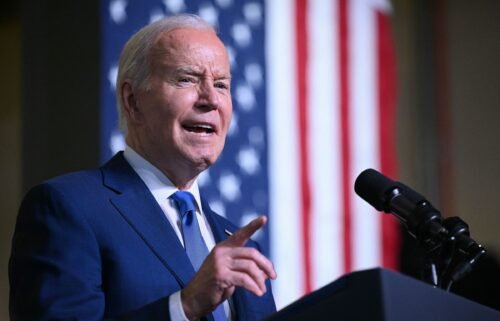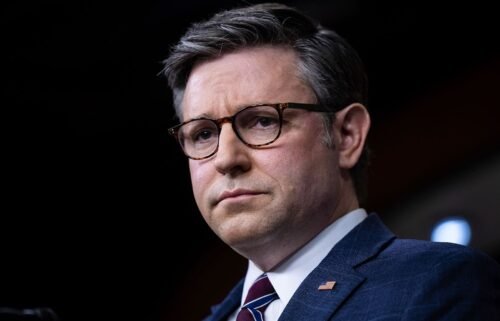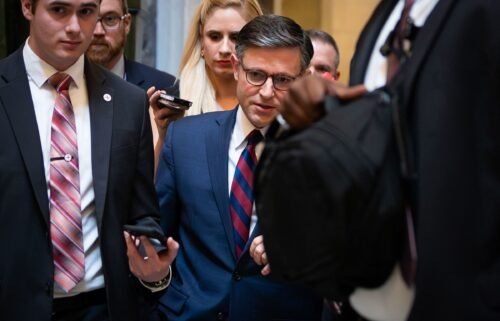Why even a popular bipartisan issue like firefighter pay may have trouble getting passed in Congress
By Melanie Zanona and Haley Talbot, CNN
Washington (CNN) — Sen. Kyrsten Sinema and Speaker Kevin McCarthy aren’t typically aligned on many issues. But they were kindred spirits in a recent phone call on one key priority: boosting pay for wildland firefighters.
“Of course he gets it. One hundred percent,” Sinema, an independent from Arizona, said in a phone interview with CNN about McCarthy, a Republican from California. “We talked specifically about this issue and how it’s just as important in his state as it is in mine.”
A pay raise for firefighters battling blazes – which is set to expire at the end of this month – might seem like the easiest political agreement in the land, given the rare unity it inspires.
But even the most bipartisan issues are running into headwinds right now, with conservative hardliners demanding to cut back federal spending even if it means leaving aid for the nation’s worst disasters in limbo. Now even these pay raises are at risk, one of many crucial issues at stake as Congress grapples with a government funding deadline at the end of the month.
GOP Rep. Mike Simpson of Idaho, who chairs an Appropriations subcommittee, said he raised the firefighter pay issue during a recent House GOP conference call. McCarthy, whose home state of California is by far the most at-risk state for wildfires in the US, responded by suggesting they will include an extension in a short-term funding bill, either as a so-called “anomaly” or as part of a broader disaster aid package that may hitch a ride on the spending measure.
What’s less clear, however, is how Congress might tackle a more long-term – and expensive – solution. Simpson said appropriators have been hamstrung by McCarthy’s promise to hardline conservatives to pursue lower spending levels, leaving him little extra room in his budget to address the issue without significantly cutting other important programs.
Further complicating matters is that hardliners are demanding disaster aid be separated from Ukraine money in a supplemental funding package requested by the White House – potentially scuttling the most obvious path for a short-term fix for firefighter pay.
That’s one of the reasons why Simpson is calling for the GOP-led House Natural Resources Committee to take up a bill that would authorize and make permanent those firefighter pay increases and other benefits, in hopes of kickstarting action in the Senate.
“This is something that they deserve and need, but it’s wildfire season in the West. You’re gonna reduce it in the middle of fire season. Are you kidding me?” Simpson told CNN. “We need our Resources Committee to get their a**es busy – sorry, that’s sort of a bad term – to get busy and take this issue up and get the authorization, so that hopefully when we go into negotiations with the Senate on the Interior bill, we can include that increase in pay.”
‘Kicking the can down the road’
In the summer of 2021, the bipartisan infrastructure law signed into law by President Joe Biden temporarily raised pay for more than 11,300 federal wildland firefighters to at least $15 an hour, up from just $13. Firefighters then saw annual pay raises of $20,000 or 50% of a firefighter’s base pay, whichever was smaller. In the wake of disastrous fires, that money is about to dry up.
A permanent solution to increase base pay, authored by Sinema, passed out of the Senate Homeland Security and Government Affairs Committee with a bipartisan 10-1 vote. The next step is full consideration by the Senate, but so far it has not received a floor vote. The House has yet to take action on a companion bill from Democratic Rep. Joe Neguse of Colorado.
Simpson, the GOP appropriator, has been keeping up the pressure on his colleagues to act and believes House Natural Resources Chair Bruce Westerman is committed to eventually moving the bill through committee. And further enticing McCarthy to move: the bill’s GOP sponsors in the House are some of his party’s more vulnerable members, including Reps. Lori Chavez-DeRemer of Oregon and Brian Fitzpatrick of Pennsylvania. Solving an issue important to their communities would give them a key win to tout back home.
“Our federal wildland firefighters are our primary line of defense against wildfires,” Fitzpatrick said in a statement. “I am proud to join my bipartisan colleagues in leading the Tim’s Act which will ensure our federal firefighters can keep this critical pay increase, as well as access to mental health resources and adequate time off for recovery.” (The legislation is named for firefighter Tim Hart, who died after parachuting into a wildland fire in New Mexico.)
In the short term, though, the most likely fix is to address firefighter pay in a supplemental funding package, which could hitch a ride on the short-term spending patch. The Biden administration in August requested Congress approve more than $40 billion in additional spending for Ukraine, border security, and FEMA’s disaster response, including $60 million to temporarily extend the bump in wildland firefighter pay to December.
Neguse, however, said that’s not nearly enough.
“Kicking the can down the road with another temporary increase only creates further uncertainty and instability within the wildland firefighting workforce, which is precisely what we do not need at this juncture,” Neguse told CNN. “It’s time to make these increases permanent. It has broad bipartisan support. There’s no reason for us not to.”
Questions remain about how and whether supplemental funding will be attached to a spending bill, given the demands of hardline conservatives.
McCarthy – who led a congressional delegation to Maui over the weekend to see the wildfire devastation firsthand and to draw attention to the Biden’s administration’s response to the disaster – has acknowledged the need for more disaster aid. The fact that firefighter pay is part of the White House’s supplemental request only sweetens the pot more.
“It’s not just Hawaii. We had floods in Vermont. We just had a hurricane in Florida. We had a hurricane in California. We’ve got fires in Florida,” McCarthy told reporters. “We’ll be able to work through, look at the accounting of what people need, and make sure the assessments are there and make sure the money is spent wisely.”
‘We’re going to see lives lost’
The National Federation of Federal Employees warns that 30% to 50% of wildland firefighters could resign from the US Forest Service in the face of uncertainty with compensation, all while dealing with toxic working conditions.
Max Alonzo, a business representative with the National Federation of Federal Employees and a former wildland firefighter, warned that without sufficient pay and benefits, these men and women will easily find work elsewhere.
“Ninety-five percent of the conversations I’ve had, people said they are leaving if this doesn’t go through,” Alonzo told CNN. “This bill is a tourniquet right now, It’s going to keep people from leaving, not everybody, because even with this money there’s better positions out there, as far as pay goes.”
Lawmakers in Washington worry about exactly that.
“I think you’d see a lot of wildfire fighters walk off the job (if) you cut their pay by fifty percent. Do you think they’re gonna come up and put their lives on the line to fight wildfires? I doubt it,” Simpson said. “I’m concerned that we will not have the personnel to fight these wildfires if this were not to go through.”
Alonzo said that could become a major national security issue.
“If we don’t get this done, we’re gonna lose a large amount of our wildland firefighters, which is already an understaffed workforce,” Alonzo said. “If we don’t get this done, we’re gonna see our natural resources burn. We’re going to see towns burned. We’re going to see lives lost.”
While lawmakers in the West have long had to grapple with the devastation of wildfires, it’s starting to impact more and more parts of the country. Sinema believes that could help prod Congress into action.
“What we’ve seen is, as fire season becomes longer, fires have spread to places where they weren’t in the past – the East Coast, Canada, even Maui, Hawaii, which is not a place where they’ve experienced wildfires, and folks around the country are now starting to recognize this isn’t just a problem for the West,” Sinema said. “This is a problem for the whole continent.”
The-CNN-Wire
™ & © 2023 Cable News Network, Inc., a Warner Bros. Discovery Company. All rights reserved.



